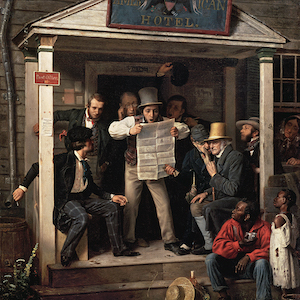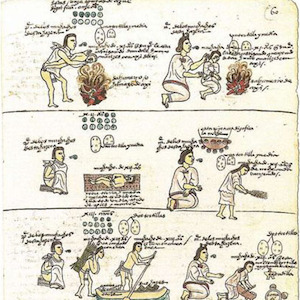North/Central America

Renunciation case against Gertrudis de Escobar, Mexico, 1659
This document is the proceedings of an 1659 Inquisition case brought against a 14 year old girl. The girl, named Gertrudis de Escobar, was accused of the crime of renouncing God. Gertrudis de Escobar was the child of a black person and a white person, termed at that time a mulata.

Mexican-American War and the Media
The contrast between coverage of the war in the United States and in England is particularly striking.
Activity: Material Culture and Childhood (20th c.)
Childhood is an ever-changing concept that varies from culture to culture across time and space, yet people often think of childhood as universal. Teaching students about children in the past is often a challenging endeavor for this very reason.

NBER Macrohistory Database
The NBER Macrohistory Database is one of the best resources and clearinghouses on the internet for economics and economic history, but it requires a little hunting to locate information.
The Spanish-American War in Motion Pictures
The collection calls attention to the way in which the emergence of the American Empire coincided with—and was in important ways shaped by—the birth of the cinema.
Avalon Project: Documents in Law, History and Diplomacy
The site is most valuable where it has gathered together extensive sources about a specific historical theme or event.
South Texas Border, 1900-1920: Photographs from the Robert Runyon Collection
These images represent a valuable visual record of life in the south Texas borderlands during the 1910s and 1920s, as well as an important window onto a relatively understudied phase of the Mexican Revolution.Long Teaching Module: Sexuality, Marriage, and Age of Consent Laws, 1700-2000
In western law, the age of consent is the age at which an individual is treated as capable of consenting to sexual activity. Consequently, any one who has sex with an underage individual, regardless of the circumstances, is guilty of a crime.
The INF Treaty
In December 1987, President Ronald Reagan and Mikhail Gorbachev signed the Intermediate-Range Nuclear Forces Treaty (INF) in Washington, DC. The treaty eliminated both nuclear and conventional ground-launched ballistic missiles with a range of 300-3,400 miles.

Gender Roles among the Nahua in the Codex Mendoza
From the time of birth, children in Aztec, or Nahua, society were socialized into gender roles. In the birth ritual introducing the infant to society, symbolic objects clearly differentiated. Boys were to be warriors and craftsmen, and girls were to tend to domestic chores.